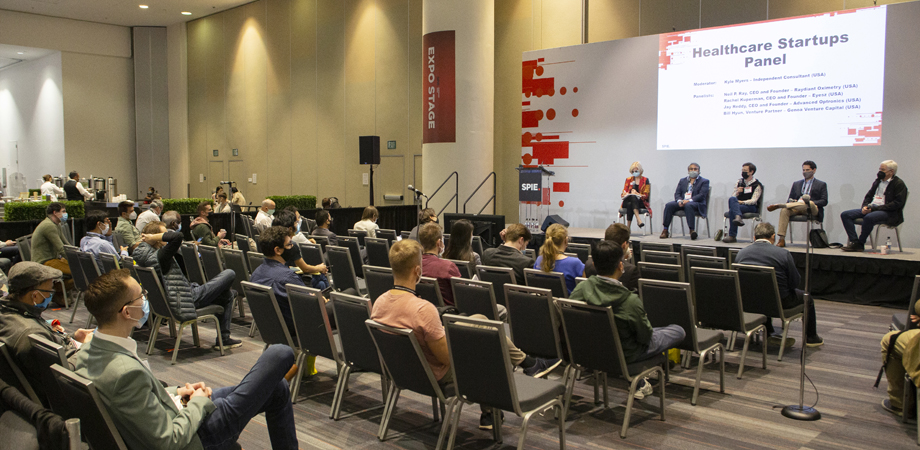Healthcare startup panel gives business launch tips

The BiOS Healthcare Startups Panel at SPIE Photonics West in January attracted a substantial and engaged crowd. This was not surprising, considering the collective experience presented by the panel, comprising a seasoned investor and three biomedical photonics entrepreneurs.
Moderator Kyle Myers, an industry consultant, formally with the FDA, asked the panel to describe their startups and why they had made the leap of faith to launch.
Dr. Neil Ray, CEO and Founder of Raydiant Oximetry, said, “The problem we are addressing is the way mothers are assessed during childbirth based on fetal heartrate monitoring, which has not changed much in the past 50 years. A consequence of the typical high false positive rates means that we perform unnecessary c-sections.
“Raydiant is working on a new way of monitoring fetal distress by optically monitoring oxygen saturation non-invasively. We started the company in 2016 and my proudest accomplishment is how we have survived over the past two years. In fact, we are probably stronger from having to adapt to Covid,” he said.
Dr. Rachel Kuperman is CEO and founder of Eysz, which is developing a digital health platform using passive eye-movements to assess neurological diseases such as pediatric epilepsy. She, too, identified a longstanding diagnostic shortfall in her field, giving her the idea for her business. “There’s been no significant improvement in assessing childhood epilepsy patient outcomes in the past 30 years,” she said. “My goal is to bring quantitative measurement capability to outpatient care in neurology. We set out to measure that and were able to show that we could identify a subtle seizure type. We are currently in clinical studies to refine our algorithms using eye movements and bring them to the FDA.”
“My biggest accomplishment in the healthcare space, over the past two years, has been the hard task of aligning three objectives: Do good in the world, make money, and develop a regulated product.”
The following panelist was Dr. Jay Reddy, founder of Advanced Optronics, which is developing flexible sensors to reduce surgical trauma during cochlear implantation (CI) in patients with severe hearing impairment. In 2021’s SPIE Startup Challenge, Advanced Optronics was the winner in the medical technology division for its flexible surgical sensor.
He explained, “One of the problems with CI is that a lot of the structures in the cochlear area get damaged during the implantation surgery so that becomes a barrier to adoption by such patients. What we are doing is putting microscale sensors on the cochlear implant to provide a sort of driver assist feature for the surgeon to reduce the trauma.
“Our biggest achievement from the past year is that we received our first funding in the form of a commercialization grant, so now we are able to work full time to develop this technology into a product.”
The final speaker, Dr. Bill Hyun has progressed from serial technology company launcher to becoming a Venture Partner at Genoa Ventures. He commented, “With my venture hat on, surviving the past two years has been the challenge. From a trend perspective, on the investments side, there’s a lot of money out there — good money that’s looking for good ideas. Genoa was able to raise funds, and the valuations of the companies that we have invested in, are up about 30% and that’s a big jump.”
Dr. Myers then asked the panel to describe some of the key factors and external agencies that had helped them most in launching their companies.
Dr. Kuperman said, “My first step was to get internal grant funding from UCSF, which enabled me to do some of the preliminary work. I participated in a program run by the US National Science Foundation called I-Corps. It’s a wonderful program with nodes all across the USA. It forces you to answer all the questions you need to ask to launch a business. I have talked to at least 200 clinicians and found that a key factor is that they do need to get paid in order to want to use a new solution you may be developing.”
Dr. Ray added, “What we had to do was take our limited resources and derisk the technology, derisk the concept to get a little more money, then continue derisking. You need to understand who is going to pay for the development, and what the regulatory pathway is going to look like. I-Corps’s program actually pays you — they will give you $50,000 to do customer discovery to ensure that what you are building is what people want.”
Dr. Reddy agreed: “I-Corps is an amazing program because it forces you to get out of the lab and talk to people. Also, one needs to see beyond technical solutions. There are a lot of non-technical barriers and the way you find out about those is by talking to people.”
Dr. Hyun added: “It comes down to two simple equations: the first is for the startup person is to define the market opportunity. An investor is always doing this return-on-investment analysis and I tell all of my entrepreneurs that I need our startup companies to pretend that they are the investor, to make that investor thesis for the startup so that you can talk their talk.”
Matthew Peach is editor-in-chief of optics.org and director of Original Content Ltd. A version of this article appeared in the 2022 Photonics West Show Daily.
Related SPIE content
VitreaLab, Quantopticon, Luminess win big at SPIE Startup Challenge
2021 SPIE Startup Challenge Winners
| Enjoy this article? Get similar news in your inbox |
|



